CANDLE & CHRONICLE
Quarterly Newsletter: November 2022
Inaugurating a new tradition
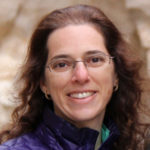
Welcome to the first issue of “Candle and Chronicle,” our new Teach the Shoah newsletter.
I’m Deborah Fripp, and along with Violet Neff Helms and Michael Fripp, I founded Teach the Shoah to honor and commemorate the millions of Jews and others who suffered and died during the Holocaust.
Violet, Michael, and I were part of the same Texas congregation when we created Light from the Darkness, a ritual design to remember those lost — as well as honoring the survivors — and learn from the lessons of their lives. We founded Teach the Shoah in 2018 to help disseminate those lessons. Since then, we have expanded our purpose and offerings. In the few short years we’ve existed, we’ve reached more than 1,000 people.
Our mission is to help others preserve the memory as the number of living witnesses diminishes. We hold workshops in person and online around the world, teaming with schools, museums, and synagogues. We also offer free workshops for individuals and families, many of them second (2G) and third (3G) generation descendants of survivors.
Although there are not many Shoah survivors left who can tell their stories themselves, many survivors left testimonies and shared their remembrances of the days before, during, and after the war.
We are now “embodying” those stories by equipping others to act as custodians of memory, absorbing and transmitting these often searing, and always deeply moving, records of lives irrevocably changed or extinguished.
We do this using the techniques of professional storytellers. Our innovative approach has led to collaborations with well-known organizations such as Echoes and Reflections.
This newsletter is meant to share what we are doing, with whom and about whom. We will inform you about news and events, and each issue will spotlight a storyteller and the stories they tell. In this inaugural “Candle and Chronicle,” we feature Leora Lazarus and her journey toward honoring her own relatives.
The words “Never Again” should never be just a stock phrase. We want the stories we tell to illuminate our lives and to help create a better and safer future, free from genocide and hate.
We hope you will join us in our mission.
B’Shalom – In Peace,
Deborah Fripp
Honoring loved ones with a story: Leora Lazarus
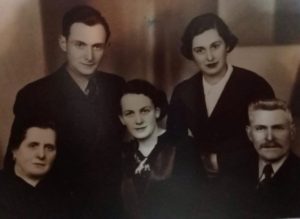
Back row: Dovid Shreero, Essia Shreero. Front row: Riva Shreero, Chava Cyderovich (Lazarus’ grandmother), Yoshuah Shreero. Only Chava survived.
“It is 1952 at the Yiddish Folk school in Johannesburg, South Africa.
“The room is dark.
“Black curtains cover the windows.
“The mood is very somber.
“The door opens, and in walks a 10-year-old little girl: Freda.”
So begins Leora Lazarus’ story of the lives of Freda, her mother; Riva and Yoshuah, her great-grandparents who were were last seen in the Vilna Ghetto in December 1942; and Dovid and Essia, an uncle and aunt killed in the Lida Massacre in 1941.
The recorded retelling of their lives is not just a story of one family, but also Lazarus’ way of giving voice to those who perished during the Shoah and fulfilling a promise she made as a girl to her grandmother — to educate the next generation and to make sure that the tragedies that befell so many Jewish families never happen again.
Lazarus’ lifelong quest to meet that promise took a great leap forward when, in 2020, she saw a presentation about storytelling by Teach the Shoah. Since that introduction, her participation in workshops and presentations organized by Teach the Shoah has been “life-changing and transformative,” said Lazarus, a longtime teacher.
“Teach the Shoah has given me so many avenues to explore so many different ways of telling my family story, and each time I tell a story, I find more and more connections and more and more places to look to find out more about the stories that I tell,” she said.
Educated at Barkly House Teachers Training College in Cape Town, South Africa, Lazarus is a bestselling author of Jewish-themed books and a longtime teacher who has taught in both Africa and the United States. She once ran, in San Diego, a free mobile preschool, called Play To Learn. Students affectionately called her “Teacher Lee.”
As an educator, said Lazarus, she always told stories. “I am that teacher that gets into a Moses costume and runs around and does the Exodus story,” she said. “So I feel like I’ve always been a storyteller. However, I never had the title ‘storyteller.’”
Lazarus had been telling stories online and in the books she authored when she volunteered to tell a story for a presentation by Teach the Shoah. She was “hooked” as she listened to other people’s stories, and her appetite for telling her family’s story grew.
So has her drive to conduct more research into her family’s history.
That drive, Lazarus said, began when she was just 10 years old and scouring the local phonebook for people with similar names to hers in the Jewish community in South Africa where she was raised.
“I used to call them up and say, ‘Hello, my name is Leora. And I saw your telephone number in the phonebook, and you have a similar name to mine and I’m trying to find my family. Are you part of my family?’” she said. “And 100 percent of the time, everybody said no.”
Her grandmother hesitated to share her experiences, but sometimes would say something that became a guidepost for research, said Lazarus. Her mother has been a primary source, writing a testimony about her family’s history.
“My mother actually remembers the day my grandfather got the telegraph saying that he was the only member of the family left,” said Lazarus.
Once, she posted her great-aunt Rosa’s picture on Facebook in hopes that someone seeing it might have information. Someone did respond, sending Lazarus a copy of her great-aunt’s displaced-persons certificate that confirmed that her aunt was in Stuttgart, Germany, when the war ended.
“Because none of my family’s information is documented, I have had to put together a lot of information on my own,” she said.
Lazarus also tells stories about Rosa and her great-uncle’s wife, Esther. But there are still gaps to fill in. For example, her mother does not know if her grandparents were still alive in December 1942, when she was born.
“My mom’s not so young anymore,” said Lazarus. “I still strive to try and find answers for her to try and help her get some closure on her grandparents and her aunts and uncles.”
News & Events
This has been a busy autumn for Teach the Shoah!
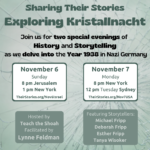 On Nov. 6 and 7, we debuted our new history/storytelling format with a virtual presentation on Kristallnacht, the tragic pogrom that inaugurated the Holocaust. Lynne Feldman did a beautiful job contextualizing Kristallnacht for us, tying together powerful stories told by Michael Fripp (Herschel Grynszpan), Esther Fripp (Margot Jeremias), Tanya Wisoker (Emmanuel Ringelblum) and Deborah Fripp (Margot Jeremias).
On Nov. 6 and 7, we debuted our new history/storytelling format with a virtual presentation on Kristallnacht, the tragic pogrom that inaugurated the Holocaust. Lynne Feldman did a beautiful job contextualizing Kristallnacht for us, tying together powerful stories told by Michael Fripp (Herschel Grynszpan), Esther Fripp (Margot Jeremias), Tanya Wisoker (Emmanuel Ringelblum) and Deborah Fripp (Margot Jeremias).
Deborah wrote a coordinated blog on Kristallnacht for the Times of Israel that we hope you’ll read. It talks not only about that horrendous night 84 years ago, but also why our organization exists.
Storytelling Director Jennifer Rudick Zunikoff led our monthly Exploring Their Voices introduction to Holocaust storytelling workshops on Oct. 19 and 25. Join us for our next workshops on Dec. 7 (8 pm Israel, 1 pm EST: TheirStories.org/Dec7Israel) and Dec. 12 (8 pm EST: TheirStories.org/Dec12USA).
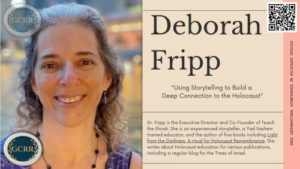 Copresenting with storyteller Kathleen Mullen, Deborah and Jennifer gave a talk on “Using Storytelling to Build a Deep Connection to the Holocaust” at the Global Center for Religous Research’s Holocaust Studies International eConference on Oct. 30. View their presentation here.
Copresenting with storyteller Kathleen Mullen, Deborah and Jennifer gave a talk on “Using Storytelling to Build a Deep Connection to the Holocaust” at the Global Center for Religous Research’s Holocaust Studies International eConference on Oct. 30. View their presentation here.
We are looking forward to commemorating International Holocaust Memorial Day in January with several programs. Watch for announcements about those coming soon. We are also pleased to be returning to the Flower Mound Public Library for our 3rd annual Holocaust memorial program.
We are happy to report that we’ve recently topped 1,000 Facebook followers! Follow us on Facebook and online for information on upcoming events and news. You can also watch previous programs at our YouTube page.
Support us on Giving Tuesday
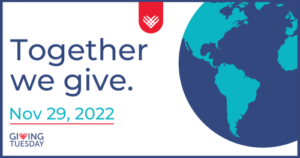 Giving Tuesday began in 2012 at the 92nd Street Y in New York as a way to link gratitude with support for nonprofit organizations. It is all about creating a generous world. We hope you will consider a donation to us this giving season!
Giving Tuesday began in 2012 at the 92nd Street Y in New York as a way to link gratitude with support for nonprofit organizations. It is all about creating a generous world. We hope you will consider a donation to us this giving season!
We would be most grateful for support that we could use to offer stipends for our professional storytellers, and to expand our reach. Thank you in advance for any help you can give! #GivingTuesday
Follow Us on Facebook & YouTube
© 2020 All rights reserved
